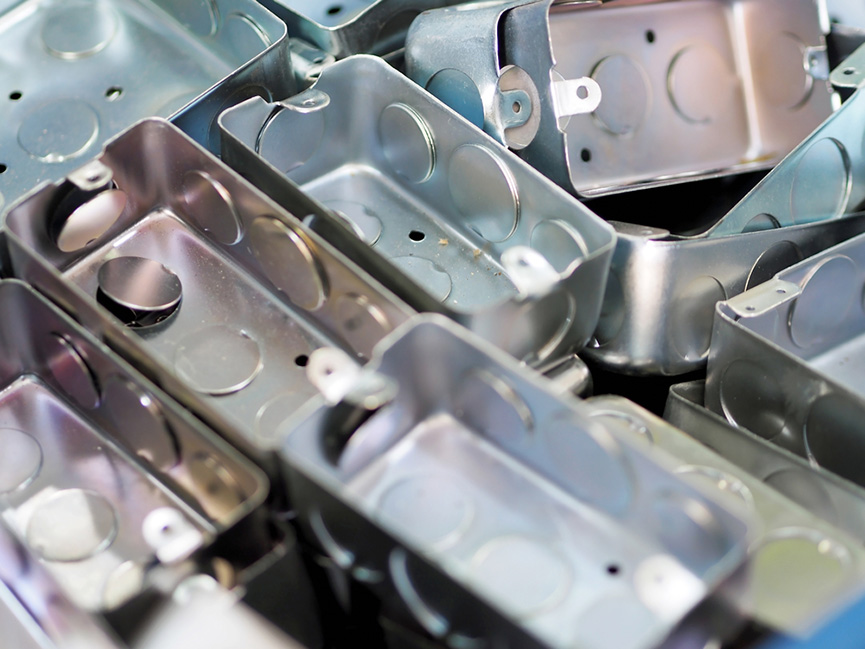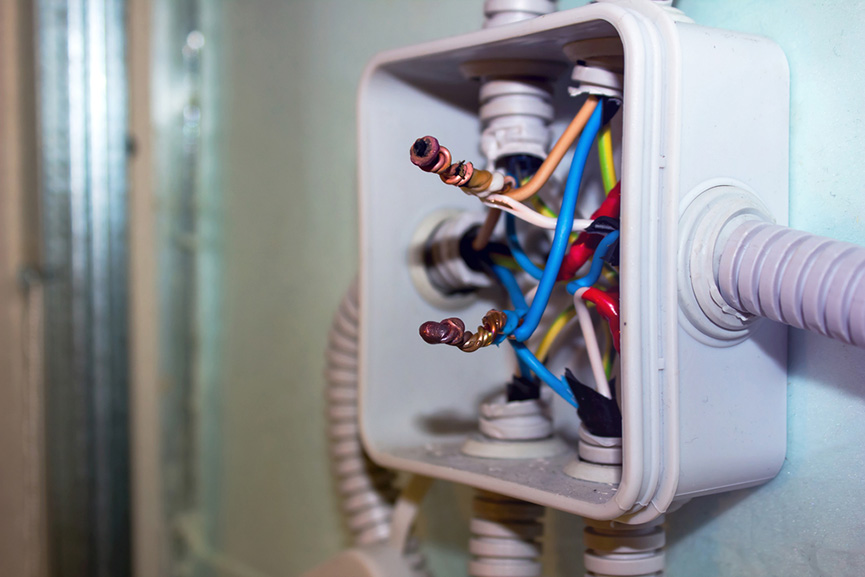Examine the wiring of anything from a light switch to a ceiling fan to an industrial control panel, and you very well might find a metal junction box protecting the wiring. Metal electrical boxes are known for their durability and versatility, which is why you’ll find them in homes, businesses and industrial facilities around the world. However, plastic junction boxes made from rugged materials like polycarbonate are also ubiquitous today — so which is the right choice for your application?
Whether you’re learning the ropes of electrical work or starting a DIY project, it’s important to know when to use a metal junction box vs. a plastic box. Polycase is a leading manufacturer of customized junction boxes for all kinds of applications — from industrial electrical systems to home electronics projects — and we can provide you with the metal enclosure or plastic enclosure that works for you.
In today’s TechTalk guide, we’ll talk about when metal junction boxes are the appropriate choice, and when you should go with plastic junction boxes instead.

Source: Jatumeth Susukh/Shutterstock.com
Metal vs. Plastic Junction Boxes
There are two types of junction boxes in common use today: metal junction boxes and plastic junction boxes. Both have their own advantages, and both are useful for certain applications.
For many applications, the biggest advantage of a metal junction box is its durability. Metal junction boxes can withstand a huge variety of adverse environmental conditions, including crushing impacts, open flames and extremely hot or cold temperatures. They also serve as natural grounding points for metal-sheathed wires and other components that require electrical grounding.
Plastic junction boxes are generally less expensive and may be easier to work with. However, some plastic junction boxes are less resilient than metal boxes, so they may not be the ideal choice if you need maximum protection and maximum durability from your junction box.
In the next sections, we’ll look at some common scenarios for when to use a metal electrical box and when you should use a plastic junction box.
Need a Metal Enclosure? Polycase Has You Covered!
When to Use a Metal Electrical Box
You should consider using a metal electrical box if:
- You use metal-sheathed BX cable. Metal-sheathed cable is designed to be used with a metal junction box to ground the wires (although you may still be required to use a ground wire of some type).
- It’s extremely important the electrical box is securely attached to a stud (rather than being attached to drywall using anchors). The rigid and warp-resistant nature of metal electrical boxes means they’re compatible with the heavy-duty screws you’ll need for an extra-secure stud attachment.
- Your project is in an exposed interior space. Some interior locations, such as unfinished basements, will have non-recessed electrical outlet boxes directly attached to a surface (usually a masonry wall). Since these applications leave electrical wiring more exposed, you should use a metal junction box to protect them from damage.
- You need a more durable type of electrical box. Some plastic electrical enclosures, particularly ones made from softer plastics like PVC, can be damaged if they’re placed under pressure. (This is why metal enclosures are a more common choice for light fixtures.) Metal electrical enclosures are generally more resilient, although modern plastic materials like polycarbonate have come a long way in making plastic enclosures competitive.
These aren’t the only circumstances in which you should choose a metal junction box, but they’re some of the most important. If you’ve decided a metal junction box is the right call, see our guide to metal electronics enclosure options for some great choices.

Source: AVAKAphoto/Shutterstock.com
When Not to Use a Metal Electrical Box
Conversely, there are also some reasons you might choose a plastic junction box for your project instead. A plastic electrical box might be a better choice for your application if:
- You’re using non-metallic sheathed wire (often called Romex wire). Romex wire and plastic junction boxes are frequently used together, especially for applications such as indoor receptacles, but metal enclosures may be acceptable as well (depending on the project). Using metal conduit with plastic boxes is generally unsafe and against electrical codes.
- It’s safe to use either metal or plastic enclosures if you want to save money. Plastic electrical boxes are typically less expensive and require less additional equipment, such as clamps, than metal electrical boxes. (Remember, though, that no amount of savings is worth trading away safety if the application requires metal enclosures.)
- You want junction boxes that make electrical installation tasks as easy and user-friendly as possible. Some types of sheet metal enclosures have sharp edges capable of causing injury, although wearing gloves or choosing a finished sheet metal enclosure can usually eliminate these risks. Knockouts may also be easier to remove on a plastic knockout enclosure than on a metal box.

Source: ungvar/Shutterstock.com
The ultimate authority, of course, is the National Electrical Code. Always verify the relevant NEC rules on enclosure materials and design before choosing your solution — or consult a qualified electrician. Ready to learn more? Check out our quick-start guide to NEC junction box rules here, as well as our enclosure materials selection guide!
